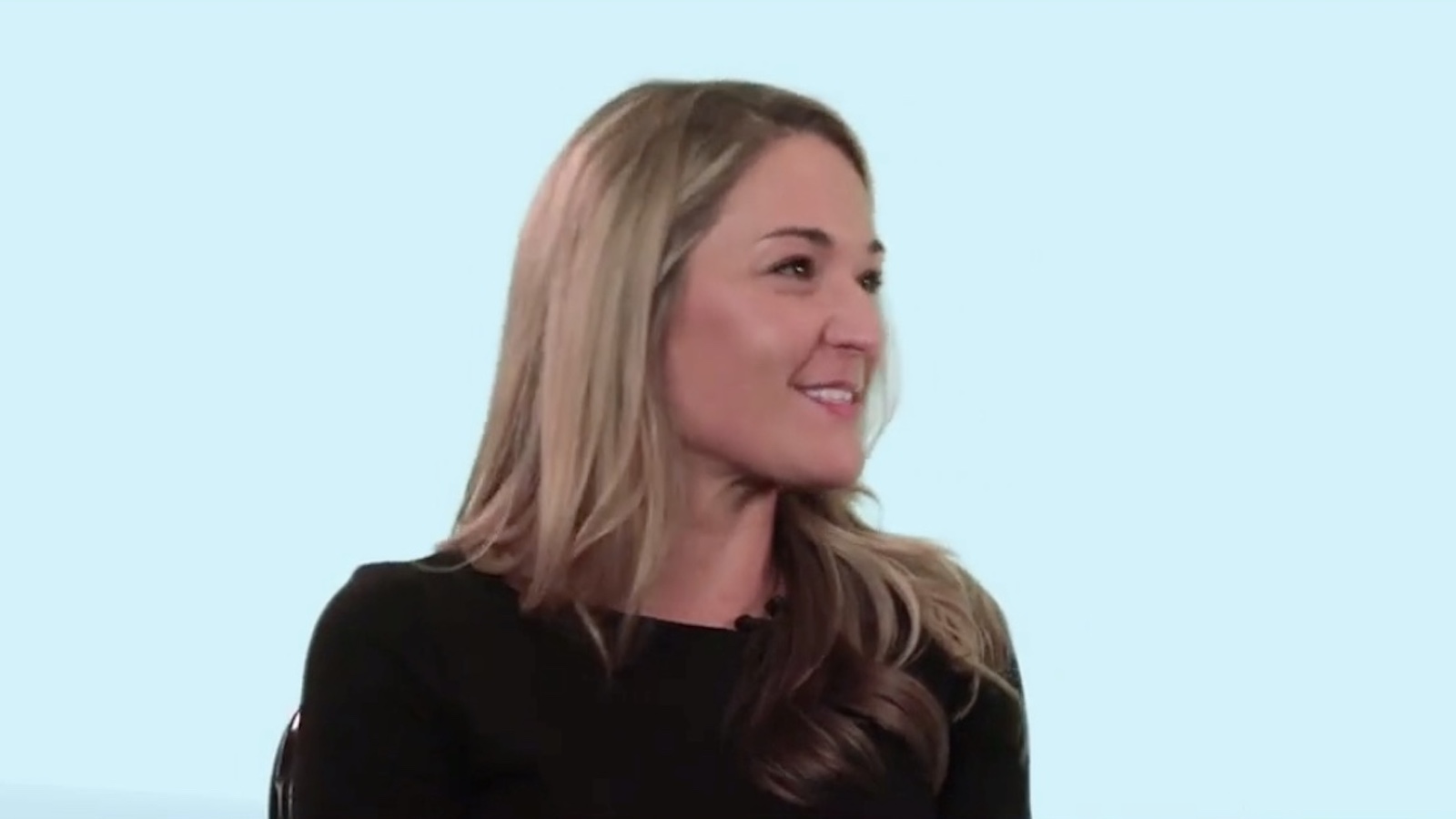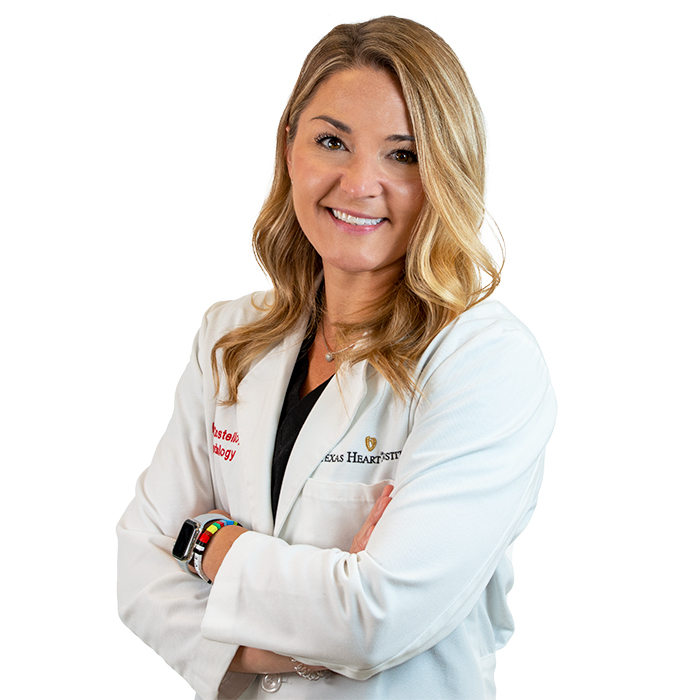THI Doctor Named Top Social Media Influencer in Cardiology

Texas Heart Institute cardiologist Briana Costello, MD, was recently named on a list of the top 100 Twitter influencers in cardiology, as described in an article published by the journal AIMS Public Health. The list, which features notable cardiologists such as Drs. Martha Gulati, Eric Topol, and Sharonne Hayes, was constructed as part of a growing effort to correlate social media influence with research output and academic impact.

“Before becoming a doctor, I never would have imagined that social media would have this kind of impact on the way medical advances are communicated,” said Dr. Costello. “Twitter has quickly become one of the easiest, most accessible ways to stay up to date with the field. It’s a way to continue learning.”
Dr. Costello amassed a notable following during her training as a fellow, when Twitter became a go-to platform for discussing challenging clinical scenarios with other trainees. At that time, Dr. Costello maintained a weekly informal discussion session known as the “Fellows in Training Tweet-up” (#FITTweetup), in which she would present a complex case and poll her colleagues on treatment options. These posts routinely generated hundreds of responses as trainees discussed the nuances of each case with additional input from more experienced cardiologists.
“One great aspect of using Twitter as a healthcare professional is the ability to filter the news that matters to you,” said Costello. “The Tweet-ups were a perfect way to discuss a topic of interest with my peers. We didn’t always know the right answer but were eager to discuss and learn. Twitter allowed us to find each other and focus our social media feeds on these kinds of topics.”
Dr. Costello estimates that she spent an average of 3 to 4 hours going over case reports, clinical studies, and other literature to prepare for the Tweet-ups, emphasizing the capacity of Twitter to serve as a tool for continued learning. Although she no longer maintains these weekly sessions, the practice has caught on among other clinicians on Twitter. Discussions about complex cases have become abundant among doctors from all fields.
Notably, early-career cardiologists like Dr. Costello accounted for a significant portion of the top 100 cardiology influencers on Twitter. Given the oft-criticized hierarchy associated with medical practice, the study’s authors reported this as a positive finding.
“Twitter provides young doctors and trainees a platform where they can feel comfortable responding to each other and involving themselves in discussions,” said Dr. Costello. “In the clinic, many early-career doctors feel hesitant to challenge or question more senior doctors. Online, it’s easier to participate in educational discussions and debates without always knowing the answer. There’s an entire community of peers eager to engage in these learning opportunities.” Dr. Costello attributes much of her social media following to this openness.
Another important facet of social media use among medical professionals is the erosion of barriers between doctors who wouldn’t typically interact because of differences in specialty, experience, or location. Dr. Costello, who is passionate about women’s health and rare diseases, such as fibromuscular dysplasia, has used Twitter to connect with other clinicians who have similar interests.
“Fibromuscular dysplasia is a life-altering condition for women who are diagnosed with it,” said Dr. Costello. “There is a small social media community of doctors with whom I’ve collaborated to discuss specialty cases such as these. Twitter has facilitated these collaborations in a way that was never possible before. The real-time distribution of science and knowledge among peers is incredible to witness and take part in.”
In addition to enhancing collaboration among peers, Twitter also serves a valuable role in connecting young doctors with more experienced practitioners, who can take on mentorship roles facilitated by social media interaction. Dr. Costello says she has met and formed relationships with several influential figures, such as Dr. Anabell Volgman and Dr. Martha Gulati, who have helped shape her career via Twitter.
“Many experienced physicians are big social media personalities as well as respected doctors,” said Dr. Costello. “Dr. Volgman helped mentor me through research and residency. She has always been vocal about getting out there and meeting new people to collaborate and explore ideas with. Dr. Martha Gulati is a highly respected figure in the cardiology community, and she has always used social media very effectively. In these communities, people’s Twitter profiles are typically a good reflection of who they are as a doctor and as a person.”
Now that she is out of training and practicing in the field, Twitter serves a slightly different role for Dr. Costello. Instead of hosting discussions with doctors-in-training, her Twitter feed is catered more toward case reports and clinical trials.
“I definitely use social media differently now compared to my fellowship years,” said Dr. Costello, “but this new perspective is still very exciting to me. I’ll open my feed and see the latest buzz about a conference or trial in a way that was never possible before.”
Dr. Costello foresees the medical community using Twitter and other social media sites in this manner for years to come.
“There’s no turning back. In fact, the use of social media in the medical community will probably only become more prevalent. I encourage young doctors to get on Twitter and read about what’s going on in the field, even if you don’t always interact. There’s no better window into what’s going on outside your bubble as a doctor.”
By: Skylar Buchan
ABOUT TEXAS HEART INSTITUTE (THI)
The Texas Heart Institute, founded by world-renowned cardiovascular surgeon Dr. Denton A. Cooley in 1962, is a nonprofit organization dedicated to reducing the devastating toll of cardiovascular disease through innovative and progressive programs in research, education, and improved patient care. THI’s scientists and physicians conduct fundamental biomedical, translational, and clinical research in cardiology, cardiovascular surgery, molecular-based medicine, stem cell, and gene therapy, and regenerative medicine both independently and in collaboration with organizations worldwide. As a global leader of patient care for nearly six decades, Texas Heart Institute has been ranked among the top cardiovascular centers in the United States by U.S. News & World Report for the past 30 years. THI is dedicated to spreading awareness and sharing updates on ways to prevent, treat and defeat the cardiovascular disease. With over 10 million visitors coming to its website from around the world every year, www.texasheart.org is just one of the ways THI is helping to educate people on the importance of heart health. For more information, please visit https://www.texasheart.org.

.svg)


